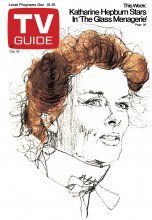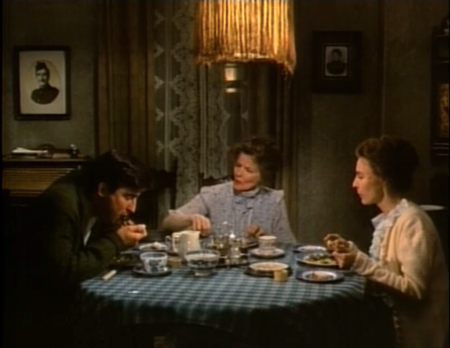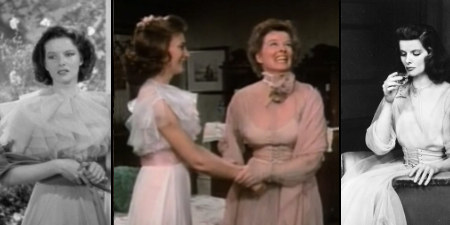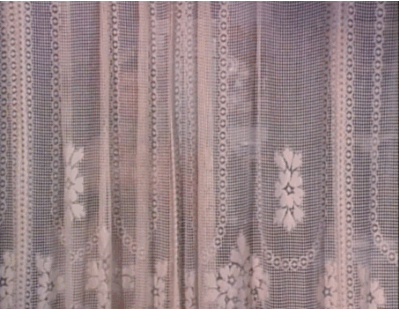A Year with Kate: The Glass Menagerie (1973)
 Wednesday, October 1, 2014 at 1:00PM
Wednesday, October 1, 2014 at 1:00PM
Episode 40 of 52: In which Katharine Hepburn takes to TV to show that Laurette Taylor can eat her heart out.

Apparently Kate adapted to TV quickly. Mere months after her first two part television interview on The Dick Cavett Show, Katharine Hepburn returned to the small screen, this time to act. Director Anthony Harvey (last teamed with Kate directing The Lion in Winter) did away with the more fantastical elements of the play in order to get a more "natural" feel, relying on strong acting rather than stagecraft. Nonetheless, The Glass Menagerie remains a touching work of nostalgia and regret that comments in unexpected ways on its legendary lead actress’s life.
When The Glass Menagerie premiered in 1944, Laurette Taylor’s performance as Southern matriarch Amanda Wingfield effectively revolutionized American theatrical acting. In her second foray into Williams’ world, Katharine Hepburn steps out of Taylor’s long shadow. Hepburn's Amanda is not a dreamer, but a fighter. (The biggest shock: Katharine Hepburn, she of the infamous Bryn Mawr brogue, nearly conquers a Southern accent.) Kate plays the most Yankee Southern Belle; she speaks quickly and she demands rather than cajoles. As Kate plays her, Amanda uses her frequent escapes into memory as anecdotal proof that her current suffering is undeserved.
Trivia, nostalgia, and a good reason never to clean out your closet after the jump.
 Another explosive family dinner courtesy of Tennessee Williams.
Another explosive family dinner courtesy of Tennessee Williams.
It's a gamble to play Amanda with such conviction, and for the most part it works. Kate’s Amanda chafes against Sam Waterston’s Tom, who so clearly is a dreamer. And Amanda simple steamrolls over her daughter, Laura (dewy-eyed Joanna Miles, only limping slightly). By the time the gentleman caller (Michael Moriarty) arrives to upend their fragile peace, it feels not so much like an intrusion as a welcome distraction from the painful realities of the Wingfield household. All four actors would nab Emmy nominations for their performances, and they were well-earned.
Tennessee Williams' memory play on the Great Depression is a work of reflection, not just for Williams but also for Katharine Hepburn. Patricia Zipprodt (who has a great name for a costume designer) replicated or reused two gowns associated with early Hepburn. Kate herself wears the dress from her triumphant 1938 stage production of The Philadelphia Story, which only required a touch of letting out and an (honestly awful) neck corsage. More surprisingly, Joanna Miles’s dress is a close replica of one worn by Hepburn in one of her most financially successful 30s vehicles, Stage Door, which emphasizes just how much Joanna Miles looks like a young Kate.

For eagle-eyed audiences, it could be a happy bit of trivia to tuck away. But the costume choice also adds something metatextual both to the movie and to Kate’s career. Watching the Amanda flit around in the dress in which Katharine Hepburn had won her comeback almost four decades ago, I started reminiscing on Kate’s RKO career. Amanda Wingfield in this context becomes the anti-Kate, a woman just as convinced of her own magnificent exceptionalism, whose luck would never through as it had for Hepburn. There was, in the late part of the 1930s, a chance that Kate could have failed, and been left clinging to her memories and her carefully preserved costumes as Amanda does. But somehow, this makes Amanda Wingfield more dear. With nearly forty years and three Oscars between Kate and the 1930s, the past recedes into an unhappy memory rendered noble by the success that followed.
Memory tinges the sweet sadness of Tennessee Williams's work. Through the lens of nostalgia, the Wingfields’ petty quarrels and terrible poverty are imbued with a sense of longing and symbolism, though for him the past was a burden to bear. Hepburn, possibly more popular (or at least less controversial) in her 60s than she was in her 20s and 30s, could afford to look back on her early career with fondness. She never expressed the kind of regrets that Williams did--though she had some, she refused to name them. Instead, Kate looked forward as always. The Glass Menagerie marked the last “serious” play adaptation Kate performed onscreen, beginning the weirdest (and last) chapter of Kate’s career.
What do you think of our Yankee Southern Belle? Are you feeling nostalgia for Kate's earlier movies as our year draws to a close?

 Previous Week: A Delicate Balance (1973) - In which Katharine Hepburn stars in an Edward Albee play that's not Who's Afraid of Virginia Woolf? and does her first television interview.
Previous Week: A Delicate Balance (1973) - In which Katharine Hepburn stars in an Edward Albee play that's not Who's Afraid of Virginia Woolf? and does her first television interview.
Next Week: Love Among The Ruins (1975) - In which Katharine Hepburn does a TV movie with Laurence Olivier and George Cukor, which might have been disappointing if it wasn't so good.



Reader Comments (11)
I believe that this was the very first thing I ever saw Katharine Hepburn do that I was certain it was her and wanted to see (I think my parents watched The African Queen and I caught a glimpse before bedtime). I was 11 years old at the time.
I thought this was an amazing production. Not just Kate, but the whole thing. I even tracked down the earlier adaptation of the play with Jane Wyman (the only name I can remember) and maybe Kirk Douglas? I thought it was awful. It certainly made me appreciate this TV version better.
I though Kate was just heartbreaking as a woman who was clearly not nuts, but just had never caught a break, and was also a victim of the time period. And she wasn't a bad mother really, just a bit out of her depth. To me it brings greater poignancy to the play/TV movie.
The other three actors were probably at their peak, certainly of youthful talent.
I really think I need to see this again!
Dave - It's on Netflix and YouTube! I highly suggest a re-watch. The Glass Menagerie tends to be low on my Tennessee Williams list thanks to the overabundance of bad productions, but this is a stand out version that broke my heart.
I hope you're putting all these together into a book when your Year is over.
AHH THE DRESSES! Amazing!! I would never have put that together but I love the metatextual oomph it adds.
A terrific production, what I remember from it the most is Kate's monologue on the telephone, outwardly gay but tinged with desperation at the edges.
I have vague memories of this debuting and it was an enormous event with all kinds of hullabaloo as these sort of productions were at the time when real Movie Stars made the transition from the big screen to the small. I watched on its initial airing and have seen it a couple times since, it's been a while though, but it was definitely worthy of all the hype.
I wouldn't say I was nostalgic for the earlier films. I've enjoyed each week, even the painful films (Spitfire, Dragon Seed, The Iron Petticoat. Ugh!) have had some interest thanks to you Anne Marie and the comments. My favorite of her latter day work, The Corn is Green, is still to come so I'm still anxious to read each week's entry.
My dislike for the Tom character kinda prevents me from fully embracing The Glass Menagerie, but I'll always have some love for the Wingfield women.
I think Kate is wonderful in this, even though my favorite scene in this version does not involve her at all, it's Laura and her gentleman caller, as they dance and finally share a tender kiss. It's so heart warming, that brief moment of pure bliss, and also heart breaking, for the chilling revelation we know is coming.
I envision a film version of this play with Kate wherein the character of Laura accidentally breaks several winged figurines.
Amanda: "AH, THE LOOOONS!"
Delightful read!
Kate was pretty good in it.Initially, she had reservation playing Amanda, as she had watched Laurette Taylor on stage & believed that no one could ever top that performance, but Anthony Harvey manged to convince her to take up the challenge. She played Amanda in a different way, more forceful and demanding, but it worked nevertheless, as a nagging and idealistic but delusional tiger mom of sort
Joanna Miles playing the daughter was also v good, v poignant & touching performance.
This TV version is definitely an upgrade from the 1950 movie version, which Warners Bro had adapted to beyond recognition (Williams HATED that version). Paul Newman remade it again in 1987, with Joanne Woodward as Amanda, & I tink John Malkovich as Tom. This movie received little fanfare thot, wonder how does Woodward fare?
This was the first time I was aware of the brilliance of Williams and Hepburn. As someone else mentioned, it was quite an event, hyped and promoted for weeks and since there were so few choices on the box, everyone tuned in. I've always had a fondness for the play since and still find Kate's Amanda to be my favorite.
Anne Marie - I had no idea about the the costuming, you bring such a wealth of detail to these reviews, well done! I was in high school when this was telecast and it made an impression.
My foremost memory was of how well Hepburn handled the southern accent. I'm pleased that this version continues to hold up so well.
I'm looking forward to "Love among the Ruins" which is a lot of fun. Keep up the great work!